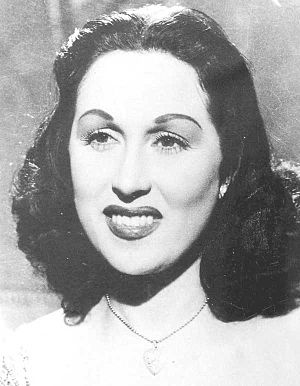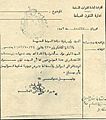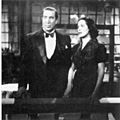Leila Mourad facts for kids
Quick facts for kids
Leila Mourad = Layla Morad
|
|
|---|---|

Layla Mourad in 1947.
|
|
| Background information | |
| Birth name | Lilian Zaki Ibrahim Mourad |
| Born | February 17, 1918 Cairo, Egypt |
| Died | November 21, 1995 (aged 77) Cairo, Egypt |
| Genres | Egyptian music |
| Occupation(s) |
|
| Years active | 1934–1963 |
Leila Mourad (also known as Layla Morad) was a very famous Egyptian singer and actress. She was born Lilian Zaki Ibrahim Mourad on February 17, 1918, in Cairo, Egypt. She became one of the biggest stars in Egypt and the Arab world during her time. Leila Mourad came from an Egyptian Jewish family known for their love of their country. She later changed her name to Leila Mourad for her stage career. She passed away in 1995.
Contents
Her Early Life and Career
Leila Mourad was born into a musical family. Her father, Zaki Mourad, was a respected singer and musician. Her mother was Gamilah Ibrahim Roushou. Leila's brother, Mounir Mourad, also became a well-known actor and composer.
Leila first performed on stage when she was just nine years old. This was at the Saalat Badi'a, a popular music hall in Cairo. The theatre was started by actress Badia Masabni, who helped Leila in her early career.
At fifteen, Leila appeared in her first film, "Al-Dahaaya" (The Victims), in 1932. This movie was originally silent, but her song, The Day of Departure, was added when it became a "talkie" (a film with sound).
Leila learned music from her father and from Dawood Hosni, who was also Jewish. Hosni wrote the first operetta (a short opera) in Arabic. He also composed two songs for Leila.
Becoming a Star
Leila's career really took off when the famous Egyptian composer Mohammed Abdel Wahab heard her sing. He gave her a role in his 1938 film, Yahia el Hob (Viva Love!). This movie was a huge success.
After Yahia el Hob, Leila starred in five more popular films with director Togo Mizrahi. She quickly became Egypt's top actress. In 1945, she made Layla Bint al-Fuqara ("Layla, Daughter of the Poor"). She married the director of this film, Anwar Wagdi, soon after.
Leila went on to make 20 more films. One of her most famous movies was Ghazel el-Banat ("The Flirtation of Girls"). This film was also directed by and co-starred Anwar Wagdi.
Later Years and Retirement
In 1953, Leila Mourad was chosen to be the official singer of the Egyptian Revolution of 1952. This was a big honor.
However, a rumor spread that Leila had visited Israel and given money to its army. This caused some Arab radio stations to stop playing her music. Leila denied these claims. The Egyptian government investigated and found that the accusations against her were false.
Leila decided to retire from acting and singing when she was 38 years old. This happened after her last film, Al Habib al Majhoul (The Unknown Lover), didn't do well. Also, a song she sang praising the 1952 revolution was banned.
Even though her films were very popular, her singing career was often compared to Umm Kulthum, another legendary Egyptian singer. Umm Kulthum was very dominant in Egypt's music scene.
Leila Mourad made a few short comebacks in 1970. She read "Fawazeer Ramadan" (Ramadan's puzzles), a traditional radio program during the holy month of Ramadan.
Leila Mourad passed away in a Cairo hospital in 1995.
Her Marriages
Leila Mourad was married three times.
- Her first marriage was to Anwar Wagdi in 1945. They divorced in 1953. Leila said their divorce was partly because of Anwar's health issues, which made him often irritable.
- She then secretly married Wagih Abaza in 1955. They had a son named Ashraf Wagih Abaza before divorcing in 1956.
- Her last marriage was to film director Fatin Abdel Wahab in 1957. They had a son named Zaki Fatin Abdel Wahab. They divorced in 1969.
Her Works
Many of Leila Mourad's most popular songs came from her musical films. Here are some of her well-known songs:
- "Yama Arak El-Nasim" (How Calm the Breeze is) from Yahya El-Hob (1938)
- "Ghany Ya Tair" (Sing, Bird) from Laila Bint Madares (1941)
- "Alby Dalili" (My Heart is My Guide) from Alby Dalili (1947)
- "Etmakhtary Ya Kheil" (Trot, My Horse) from Ghazal El-Banat (1949)
- "El Hob Gameel" (Love Is Beautiful) from Ghazal El-Banat (1949)
- "Einy Betref" (My Eye Wanders) a duet with Naguib AlRaihani, from Ghazal El-Banat (1949)
- "Bil Nizam Wal-Amal Wal-Etihad" (With Order, Work, and Unity) (1953) - This song was an anthem for the Egyptian Revolution.
Leila Mourad starred in 27 films between 1938 and 1955. She also recorded songs for the film "El-Dahaya" (The Victims) in 1935, but she did not appear in it.
| Name | English Translation | Co-Star | Release Date | Director |
|---|---|---|---|---|
| Yahya El-Hob | Viva Love! | Mohammed Abdel Wahab | January 24, 1938 | Mohammed Karim |
| Fi Laila Momtera | On a Rainy Night | Youssef Wahbi | October 12, 1939 | Togo Mizrahi |
| Laila Bint Elreef | Laila the Village Girl | Youssef Wahbi | January 2, 1941 | Togo Mizrahi |
| Laila Bint Madares | Laila the Schoolgirl | Youssef Wahbi | October 16, 1941 | Togo Mizrahi |
| Laila | Laila (Dame of the Camelias) | Hussein Sidky | April 2, 1942 | Togo Mizrahi |
| Laila fil Zalam | Laila in the Dark | Hussein Sidky | February 24, 1944 | Togo Mizrahi |
| Shohada'a Al-Gharam | Martyrs of Love | Ibrahim Hammouda | October 19, 1944 | Kamal Selim |
| Laila Bint El-Foqara'a | Laila, Daughter of the Poor | Anwar Wagdi | November 5, 1945 | Anwar Wagdi |
| Laila Bint El-Aghniya | Laila, Daughter of the Rich | Anwar Wagdi | October 28, 1946 | Anwar Wagdi |
| Almadi Almajhoul | Unknown Past | Ahmad Salem | April 8, 1946 | Ahmad Salem |
| Darbat Al-Qadr | Stroke of Luck | Youssef Wahbi | January 13, 1947 | Youssef Wahbi |
| Khatem Suleiman | Suleiman's Ring | Zaki Rostom | February 17, 1947 | Hassan Ramzy |
| Shadiat Al-Wady | Songstress of the Valley | Youssef Wahbi | April 7, 1947 | Youssef Wahbi |
| Alby Dalili | My Heart is My Guide | Anwar Wagdi | October 6, 1947 | Anwar Wagdi |
| Alhawa Wal Shabab | Love and Youth | Anwar Wagdi | January 5, 1948 | Niazi Mostafa |
| Anbar | Amber | Anwar Wagdi | November 1, 1948 | Anwar Wagdi |
| Al-Majnuna | The Madwoman | Mohamed Fawzi | January 31, 1949 | Helmy Rafla |
| Ghazal al-Banat | The Flirtation of Girls | Naguib el-Rihani | September 22, 1949 | Anwar Wagdi |
| Shati' Al-Gharam | The Shore of Love | Hussein Sidky | February 20, 1950 | Henry Barakat |
| Adam wa Hawa'a | Adam and Eve | Hussein Sidky | May 7, 1951 | Hussein Sidky |
| Habib Al-Rouh | Soulmate | Anwar Wagdi | October 8, 1951 | Anwar Wagdi |
| Ward Al-Gharam | Flowers of Love | Mohamed Fawzi | December 10, 1951 | Henry Barakat |
| Min Al-Qalb Lal-Qalb | Heart to Heart | Kamal el-Shennawi | February 26, 1952 | Henry Barakat |
| Sayidat Al-Qitar | Lady of the Train | Yehia Chahine | August 28, 1952 | Youssef Chahine |
| Bint El-Akaber | Daughter of the Great | Anwar Wagdi | February 9, 1953 | Anwar Wagdi |
| Al-Hayat Al-Hob | Life is Love | Yehia Chahine | April 5, 1954 | Seifeddine Shawkat |
| Al-Habib Al-Majhoul | The Unknown Lover | Hussein Sidky | May 23, 1955 | Hassan Al-Saify |
Legacy
In 2009, a TV series called "Ana Albi Dalili" (My Heart is My Guide) was made about Leila Mourad's life. It was an Egyptian show directed by Muhamad Zuhair Rajab. Jordanian actress Safa Sultan played Leila Mourad.
Images for kids
-
Layla with Youssef Wahbi.
See also
 In Spanish: Leila Mourad para niños
In Spanish: Leila Mourad para niños
 | Jackie Robinson |
 | Jack Johnson |
 | Althea Gibson |
 | Arthur Ashe |
 | Muhammad Ali |




